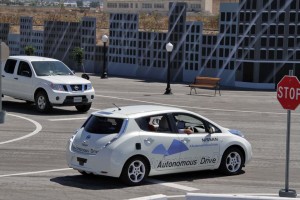Nearly nine out of 10 American adults say they would be worried about riding in a driverless car, a finding that could throw a dash of cold water on the auto industry’s race to bring autonomous vehicles to market – perhaps as soon as the end of the decade.
Put another way, only 12% of those responding to a new Harris Poll said they would not worry about letting their cars do the driving. It’s the latest in a series of studies that suggest motorists are far from convinced the new technology will be safe and reliable.
And, at a time when government spying has become a headline issue, many Americans also worry about the issue of privacy.
“This research confirms that consumers likely won’t hand over the wheel until auto companies can prove equipment is safe from software glitches or failures,” cautioned Rick Riccetti, President and CEO, Seapine Software, the firm that engaged Harris to conduct the poll.
The study found that 79% of the 2,039 adults responding feared that the equipment needed by driverless vehicles – such as sensors or braking software — would fail at some point or another, putting them in danger.
Other findings of the new study include:
- A full 59% expressed concerns about liability issues, notably who would be responsible if a driverless car crashed;
- 52 percent raised concerns about the possibility of a hacker gaining control of the vehicle;
- Over a third, 37%, raised privacy concerns, questions whether auto companies, insurers, advertisers and the government might try to collect personal data such as where autonomous vehicles are driven and how fast they drive.
Less than one in eight of those surveyed by Harris Interactive said they’d now be comfortable driving in an autonomous vehicle.
(Tesla team charges across country to set new EV record. For more, Click Here.)
The study found that men and women generally agreed about the potential risks. Significantly, there was no real gap between older drivers, who are generally less comfortable with high technology, and younger, more tech-savvy motorists. While 93% of those over 65 said they’d worry about driving in an autonomous vehicle, so did 84% of those between ages 18 and 34.
(Millennials are the group most open to autonomous technology, according to another survey. Click Here for more.)
“To meet these challenges, auto companies must implement suitable methods and measures for software development to manage quality and mitigate risk,” added Riccetti.
It’s not the first time Americans who might be offered the chance to buy driverless vehicles have expressed strong reservations about the technology.
A full 20% of Americans said they would turn in their keys if they had to use only an autonomous vehicle, according to a survey by CarInsurance.com released last November. But it also found that many motorists would be more willing to consider driverless technology if they were offered insurance discounts.
On the other hand, a survey by automotive consulting firm Accenture, released last month, found about 90% of American motorists are interested in driverless technology – or at least some of the features that are already beginning to show up in today’s vehicles, such as automatic braking systems that can stop a car in an emergency, auto-parking systems and lane-keeping technology.
Nissan has promised to put its first fully autonomous vehicle into production by 2020 and several other makers, including General Motors’ Cadillac division, are targeting similarly aggressive goals. Several other manufacturers, notably including Toyota, have expressed skepticism, however, and are currently looking only to add more advanced safety features, such as auto-braking, which would continue to leave a human driver in charge of operating the vehicle.
(Click Here to check out some of the coolest new technologies to debut at the 2014 Detroit Auto Show.)


Count me among the wary. I try to stay away from “beta” versions of stuff, and the thought of trusting my well-being to robotic, machine-control software frightens me. Ford had a hard time getting Sync right the first iteration…and finding out about a glitch while flying down the highway may not offer any second chances.
They have a Long ways to go to prove the safety of these “driverless vehicles” before they will be able to convince most people and authorities of their safety. It can certainly be done but the failsafe mode may be a huge problem.